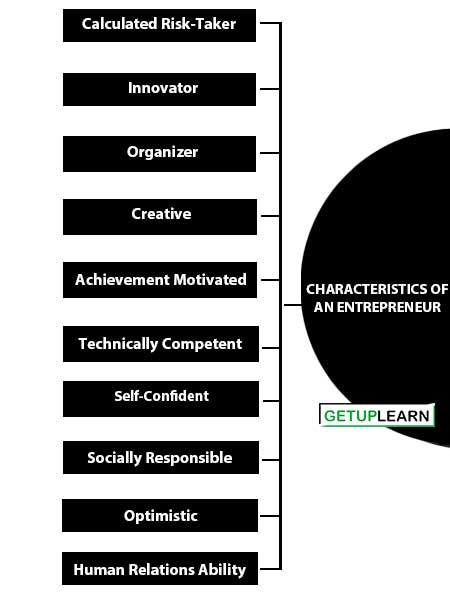Table of Contents
- 1 Meaning of an Entrepreneur
-
2 Characteristics of an Entrepreneur
- 2.1 Calculated Risk-Taker
- 2.2 Innovator
- 2.3 Organizer
- 2.4 Creative
- 2.5 Achievement Motivated
- 2.6 Technically Competent
- 2.7 Self-Confident
- 2.8 Socially Responsible
- 2.9 Optimistic
- 2.10 Equipped with Capability to Drive
- 2.11 Blessed with Mental Ability
- 2.12 Human Relations Ability
- 2.13 Communication Ability
- 3 FAQs Section Characteristics of an Entrepreneur
Meaning of an Entrepreneur
The entrepreneur has a heroic role in society as well as in the process of economic development and industrialization.
In other words, The role of the entrepreneur is a technical innovator and adopter.” The most essential and important condition of entrepreneurship is success. The earlier analysts have emphasized company promotion, risk bearing, and management as attributes of an entrepreneur.
Characteristics of an Entrepreneur
These are the characteristics of an entrepreneur explained:
- Calculated Risk-Taker
- Innovator
- Organizer
- Creative
- Achievement Motivated
- Technically Competent
- Self-Confident
- Socially Responsible
- Optimistic
- Equipped with Capability to Drive
- Blessed with Mental Ability
- Human Relations Ability
- Communication Ability

Calculated Risk-Taker
Risk situations occur when you must choose between unknown outcomes, involving potential gain or loss. Entrepreneurs are calculated risk-takers, not gamblers. They seek achievable challenges and realistic risks to succeed by applying their skills.
They avoid low-risk situations as they lack challenges and high-risk situations to ensure success. Entrepreneurs find satisfaction in accomplishing tough but realistic tasks. So, they steer clear of both low and high-risk situations because these don’t satisfy them.
Innovator
Schumpeter differentiates between an inventor and an innovator. An inventor discovers new methods and new materials and an innovator is the one who utilizes those discoveries and inventions. Not only this entrepreneur further exploits the inventions commercially and thus produces newer and better goods which give them profit and satisfaction.
Organizer
An entrepreneur brings together production factors, reduces costs, and delegates authority as the business grows. They excel as organizers and must choose the right people and financiers. Building worker loyalty and efficiency is crucial for productivity.
To expand, they need to delegate authority and trust subordinates, while long-term policies remain in their hands. An enterprising entrepreneur must be energetic, alert to new opportunities, and adaptable to change. As J.B. Say notes, they need judgment, perseverance, and knowledge, overseeing all aspects of the business with attention to order and economy.
Creative
Creativity, as field knowledge, seeks to explain how humans, either individually or collectively, reach solutions that are both novel and useful. Innovation means the effort to purposeful ventures.
Harry Nystrom states that innovation may be defined as radical, discontinuous change and creativity is the ability to devise and successfully implement such changes. Successful innovations depend on creativity and one of the most important requirements of an entrepreneur is to be creative as creativity may be taken as the cause and successful innovation as the effect.
Achievement Motivated
McClelland highlights the importance of achievement motivation as a psychological drive in explaining economic behavior. Achievement motivation involves a desire to overcome challenges and grow, not just a hunger for money. Entrepreneurs are driven by a desire for challenge, accomplishment, and service.
They excel at innovative, risk-taking tasks. Cultivating a need for achievement can enhance an entrepreneur’s organizational goals. A lack of ambition can hinder a country’s progress, but ambition can ignite resourcefulness and drive development when instilled in people. The spirit of achievement motivates specific actions and fosters national development.
Technically Competent
The success of an entrepreneur depends largely upon his ability to adopt the latest technology. Technical knowledge implies the ability to devise and use new and better ways of producing and marketing goods and services. An entrepreneur must have a reasonable level of technical knowledge.
Technical knowledge is the ability that people can acquire with hard work. An entrepreneur who has a high level of administrative, and mental ability, communication ability, human relations ability, and technical knowledge can be more successful than a person with a low level of these abilities. A dynamic entrepreneur must also be interested in changing the pattern of production to suit the requirements.
Self-Confident
It is necessary for an entrepreneur to be self-confident. He should have faith in himself, only then he can trust others. In an expanded business, delegation of authority is a must and only a self-confident entrepreneur can delegate his authority. He can seek the cooperation of his staff and inculcate a sense of work in them.
In today’s world, the traditional self-centered entrepreneur seeking personal gain is no longer acceptable. The changing landscape calls for socially conscious entrepreneurs who consider the broader social impact of their actions.
They can create jobs, invent new products and methods, and innovate ways of doing things, all with social consequences. Entrepreneurs should focus on projects of social significance, expanding their activities to promote social change and benefit society as a whole. This mindset elevates entrepreneurship from an individual pursuit to a meaningful social endeavor.
Optimistic
An entrepreneur should approach his task with a hope of success and an optimistic attitude. He attempts any task with the hope that he will succeed rather than with a fear of failure. Such a hope of success enhances his confidence and drives him towards success.
Equipped with Capability to Drive
Drive is a person’s motivation toward a task. It comprises of such personality traits such as responsibility, vigor, initiative, persistence, and ambition. An entrepreneur must exert considerable effort in establishing and managing his business.
Those entrepreneurs who work hard in planning organizing, co-coordinating, and controlling their businesses are more likely to have a successful business than the entrepreneur who is lost and haphazard.
Blessed with Mental Ability
The mental ability that contributes to the success of an entrepreneur consists of overall intelligence, i.e., creative thinking ability and analytical thinking ability. An entrepreneur must be intelligent, adaptable, and creative and he must be able to engage in the analysis of various problems and situations in order to deal with them.
Human Relations Ability
Personality factors such as emotional stability, personal relations, sociability consideration, and tactfulness are important contributors to an entrepreneur’s success. One of the most important facets of human relations ability is one’s ability to “put himself in someone else’s place” and to know how the other person feels.
This is the ability to practice empathy. The entrepreneur must have good relations with his employees, customers, etc. He must be aware of the needs and motivations of customers if he is to adequately train his employees to maintain good customer relations.
Communication Ability
An entrepreneur must possess the quality of communicating effectively in written and oral communications. Good communication also means that both the sender and the receiver understand and are being understood.
FAQs Section Characteristics of an Entrepreneur
What are the characteristics of an entrepreneur?
The following are the characteristics of an entrepreneur:
1. Calculated Risk-Taker
2. Innovator
3. Organizer
4. Creative
5. Achievement Motivated
6. Technically Competent
7. Self-Confident
8. Socially Responsible
9. Optimistic
10. Equipped with the Capability to Drive.


